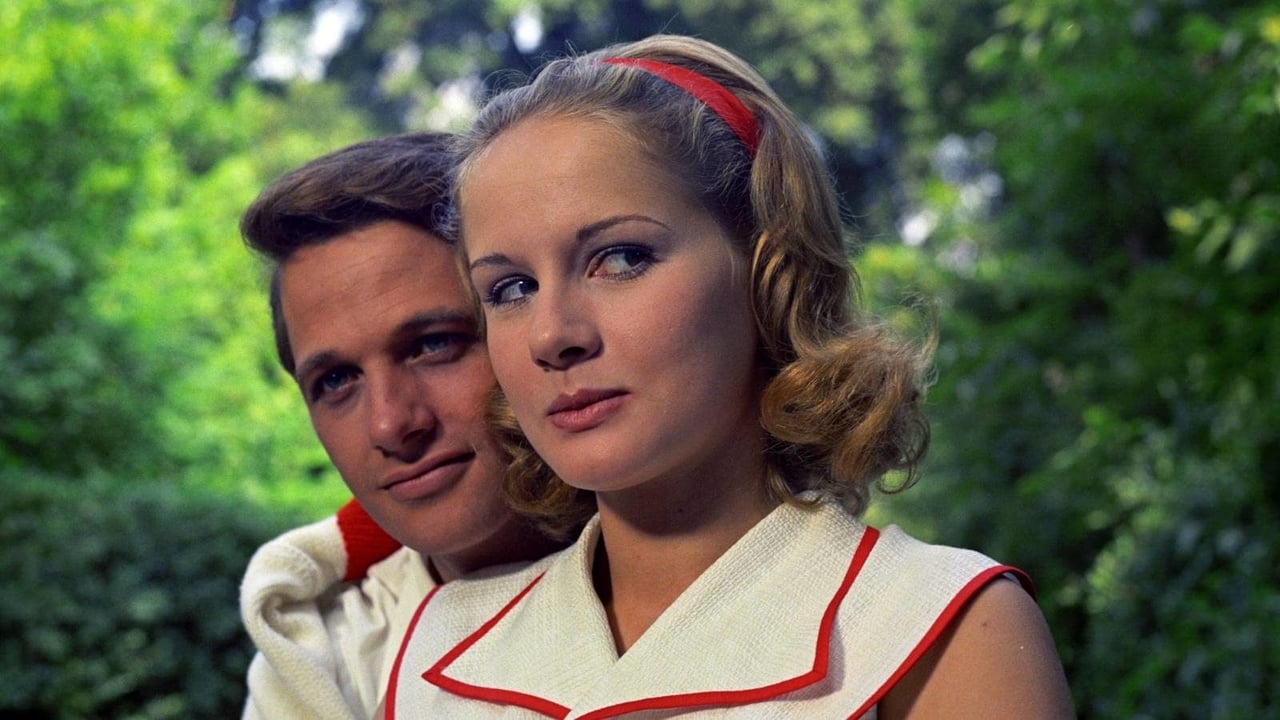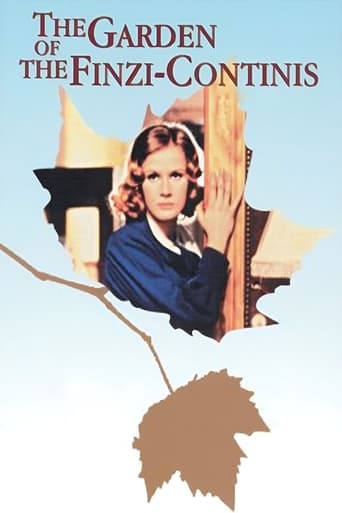

What a waste of my time!!!
... View MoreThe greatest movie ever!
... View MoreFar from Perfect, Far from Terrible
... View MoreStrong acting helps the film overcome an uncertain premise and create characters that hold our attention absolutely.
... View MoreIn the late 1930s, in Ferrara, Italy, the Finzi-Contini are one of the leading families, wealthy, aristocratic, urbane; they are also Jewish. Their adult children, Micol and Alberto, gather a circle of friends for constant rounds of tennis and parties at their villa with its lovely grounds, keeping the rest of the world at bay. Into the circle steps Giorgio, a Jew from the middle class who falls in love with Micol."The Garden of the Finzi-Continis" won the Academy Award for Best Foreign Language Film and was nominated for Best Screenplay Based on Material from Another Medium. It won the Golden Bear at the 21st Berlin International Film Festival in 1971. It is considered de Sica's penultimate film, though this depends on how you count.The film itself is very beautiful, and the quality would make me think 1980s more than 1970. Italian cinema tends to be behind American cinema in technology, and I am quite impressed with what they were able to achieve here. It really is something of a masterpiece in the look. The characters are well fleshed-out, and I am not surprised that some of the actors went on to bigger things (e.g. Helmut Berger).One thing that strikes me as interesting today (2017) is how films around the Holocaust have been consistently successful in awards season. This was almost 50 years ago, and today we still get the Holocaust film again and again. That is not a criticism of the filmmakers. There is no story more powerful in the last 100 years. It just strikes me as interesting how film has chosen that as the nexus, the focal point. You might think American films would try to pivot to 9/11 (admittedly a far, far smaller event), but this has not really happened.
... View MoreA stunner. Vittorio De Sica's late career masterpiece exposes the hopeless plight a lot of Italian Jews faced as the lunatic Mussolini got further and further into bed with Hitler during WWII. The Finzi-Continis, a well-to-do family of intellectuals fail to realize the rising tide of anti-semitism around them as their vast estate becomes more and more a sanctuary for their equally blind friends. Unrequited love and missed chances at romance are dwarfed in importance as the Nazis move in. This is a very unsettling movie as you're well aware of what is going to happen to these people. De Sica (and five or six uncredited scriptwriters) creates a real sense of dread and the film is populated with an excellent cast. Lino Capolicchio is the standout, hopelessly in love with Finzi-Contini débutante Dominique Sanda. As Sanda's infirm brother, Helmut Berger personifies an entire race of people about to be systematically eliminated. Fabio Testi and Romolo Valli (excellent as Capolicchio's grotesquely optimistic father) are in it too.
... View MoreIn its own quiet way this Vittorio de Sica gem is as gripping and powerful as such more graphic Holocaust films as "Schindler's List" and "Salo or the 120 Days of Sodom." It deals with a wealthy Italian Jewish family living in a secluded estate in the city of Ferrara. The Finzi-Continis are almost completely assimilated and have little in common with their fellow Jews, but once Mussolini's racial laws begin to take effect they open their gardens to young Jews from the neighborhood. The movie depicts the fatal passivity of people who think they're safe, that monstrous social upheavals won't touch them. Slowly but surely the Jews of Italy have their freedom taken away from them; before they know what's happening they're headed for Auschwitz. The movie leaves the fate of the Finzi-Continis unresolved, but we know from the novel by Giorgio Bassani that none of them survived. This film is beautifully photographed with the visual opulence one has come to expect from Italian cinema, with a haunting score and memorable performances, especially by the ravishing Dominique Sanda, quite possibly the most beautiful woman to ever appear on film. This is a movie everyone should see, since it drives home only too clearly the lesson that freedom can never be taken for granted, that what happened in Nazi Germany or Fascist Italy could happen here too. No one is safe.
... View MoreDe Sica is celebrated as the man who brought "neo-realism" to film, one of the three or four philosophies that still vie as motivation for the film enterprise. It is the notion that though film necessarily artificializes, it is possible to start with truth and deliberately enhance it cinematic ally. Because he relied on class struggle, viewers mistakenly associate that with the essence of neo-realism.His early work is much celebrated, but as he aged and added layers and nuance, his relatively simpleminded audience was lost. Here we have a later masterpiece, not generally regarded as such.The basic story is of two Jewish families, the impeding brutality of fellow Italians and different approaches to life and love in the knowing face of doom. At that level, it has some charm and power.But what he has done is to invert all the values and superimpose them on the originals. Its a common technique in writing, and found of course in the novel. We have the obvious: a relatively small garden within which the inhabitants blithely create an artificial world while the real world grinds down upon them. The garden is in Europe, but it is also Europe.As I say, That's obvious. Also common (far too common) is the placement of sexual mechanics in political mechanics as if one explains the other while they cause each other. Ho Hum. But there are three other elements, and these I appreciate. While he is reversing things and overlaying them, he casts accordingly. The European fiction was that Jews were dark, earthy people. Hairy, monetary, shrewd, animal. Yet the actors who play the Jews are according to cinematic conventions of Aryans: light haired, light skinned, svelte. Their manner is similarly cinematic (and the Nazi/fascist movement was inherently cinematic): completely unconcerned about money and politics and instead concerned about poetry and idleness. Roles reversed: we know this for certain when the (Jewish) girl tells her (non-Jewish) suitor he is not her type; too communist and too hairy.There's another, explicit inversion: the thing is a movie, but the anchor of reality within it is, well, movies. Three times. Plus our hero goes from Passover at his house where the family is singing something vapid to the Finzi-Continis where they are doing something movie-like" looking into a glass to see the future.Third: we know this is not straight-on narrative, because the camera has a habit of drifting out of the narrative frame. Kar-Wai is the current master of this and for the same reason.Naturally, underlying it all is that this is not the work of fascists or Nazis, but of Italians and Germans. Not few, but many, essentially all. Because of that one thing, I find this more powerful than "Schindler's List." Sure, his people were more demonstrably evil, but so are all his villains in his fakey worlds. It doesn't make it real if he shows real history in the same theatrical way. No, for real evil we have to see how ordinary it is.Ted's Evaluation -- 3 of 3: Worth watching.
... View More